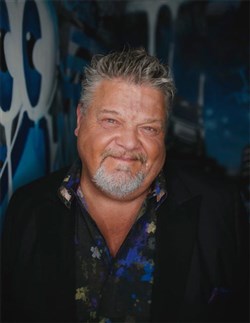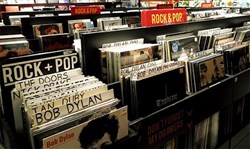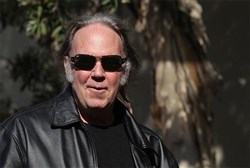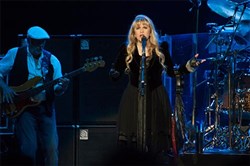VOL. 45 | NO. 6 | Friday, February 5, 2021
Selling out or seeing the future?
By Tim Ghianni
When much-honored songwriter, publisher, producer, Music Row Renaissance Man Craig Wiseman is asked about the ongoing flurry of big-name artists like Bob Dylan and Neil Young selling their song catalogs, there is wonder mixed with mirth in his voice.
“What’s really shocking is that these are absolutely anti-commercial guys,” he says. “This proves that the anti-commercial philosophy can be bought.
“The ‘I’m not for sale’ can be bought if the money gets high enough.”
He’s not being critical. He’s dabbled in catalog sales himself in his multifaceted career that includes 29 No. 1 hits, 350 cuts, 125 singles and 100 million albums sold.
But he is intrigued by the massive paydays artists are engineering by selling their most-precious commodity: Their songs.
While Young sang of searching for a heart of gold, he instead found a pot of gold: $150 million.
It’s a big step into commercializing his music that seems directly opposite of his stand pronounced dramatically in a 1988 song and video.
Young’s 1988 “This Note’s for You” was a slashing “Neil attack” on the fact that so many rock stars – even those of the anti-corporate 1960s vintage era from which he emerged – had allowed their songs to be used for commercials.
Ain’t singin’ for Miller
Don’t sing for Bud
I won’t sing for politicians
Ain’t singin’ for Spuds
This note’s for you. …
The song was accompanied by a video in which a Michael Jackson impersonator moon-dances for Pepsi while his hair is set afire, a pointed parody at a real instance in the very commercial career of the King of Pop.
There also are jabs at Eric Clapton, Whitney Houston – who uses her sponsor Coke to extinguish Jackson’s sizzling head, Spuds McKenzie, perfume sponsorships (see Rolling Stones later in the story) and more in this anti-commercial video.
MTV – then the fortress for rock videos, wall-to-wall – banned it from its rotation, at least for a while back in 1988. It wasn’t so much that they minded Young taking broad swipes at other stars, it was the fact he used real product in the video, and news reports stated, MTV had a policy against product placement, fearing it would cut in on paid advertising.
A circa-1988 Young took offense at commercialization of rock ‘n’ roll music.
Hipgnosis investment policy, as quoted from its website:
The Company’s investment policy is to diversify risk through investment in a Portfolio of Songs and associated musical intellectual property rights (including, but not limited to, master recordings, rights over future Songs that are acquired by the Group through the payment of advances to such songwriter and secured against the future Song, and producer royalties). The Company seeks to acquire 100 per cent. of a songwriter’s copyright interest in each Song, which would comprise their writer’s share, their publisher’s share and their performance rights…. The Company, directly or indirectly via portfolio administrators, enters into licensing agreements, under which the Company receives payments attributable to the copyright interests in the Songs which it owns. Such payments may take the form of royalties, license fees and/or advance payments, including: mechanical royalties – when a copy of a Song is made, whether physical (e.g. CDs, DVDs) or digital (e.g. permanent downloads, streaming, webcast); performance royalties – when a Song is performed live or broadcast on TV or Radio, or when a song is streamed online; and synchronization fees – when a Song is used in another form of media (e.g. movie, TV show, video game, advertisement)…
“MTV, you spineless twerps. You refuse to play ‘This Note’s for You’ because you are afraid to offend your sponsors. What does the ‘M’ in MTV stand for: music or money? Long live rock and roll,” was Young’s published response at the time.
Now, money talks, and the iconic rocker whose soul-searing whine and flaming guitar alternates with his calmer acoustic folk-like self, sold half of his copyright and income interests in almost 1,180 songs to Hipgnosis.
The deal yielded an estimated $150 million to the 75-year-old who had taken such a strong stand against commercialism overtaking art.
The buyer in this case, Hipgnosis Songs Fund, is a British company that invests in hit songs basically as assets and gives investors opportunities to make money from royalties. The theory is that the music will increase in value as the world turns toward streaming music over physical product.
The company has spent a good share of the last year laying out hundreds of millions for catalog investment assets.
The company also has been quoted as stating it will not necessarily “sell out.” In Young’s case, at least, he maintains some say along with his 50% stake.
Merk Mercuriadis, an industry veteran who founded the U.K. firm, told NBC News it is unlikely that his firm will violate Young’s longstanding opposition to licensing his songs for commercials.
“There will never be a ‘Burger of Gold,’ but we will work together to make sure everyone gets to hear them on Neil’s terms.”
Barry Manilow, Chrissie Hynde, The Chainsmokers, Timbaland and Richie Sambora are just a taste of the corps Young is joining by selling songs.

Craig Wiseman has been on both sides of music catalog sales, selling his own work while purchasing the publishing catalogs of others.
-- Shutterstock.ComWiseman says Hipgnosis just got another round of funding, and the catalog acquisitions will keep booming.
“They’ve already proved their model,” Wiseman says. “There’s no reason they won’t continue to do what they have been doing, which is buy notable and major copyrights.”
Young is leaving a diminishing army of artists, including guys like Bruce Springsteen and the estate of Tom Petty, who so far have refused to sell their copyrights and risk their songs being used in commercials. But the likes of Iggy Pop, AC/DC and Guns ‘N’ Roses have heard their songs adapted for commercials.
Worth noting is that Young’s “This Note’s for You” was aimed at not just at the use of rock songs in commercials and the like, but also against the corporate sponsorship of rock tours. The Rolling Stones pretty much broke that barrier in their 1981 American tour.
Jovan is reported to have paid $1 million to put their name on Stones tickets for that tour. A paltry sum, sure, but it made history 40 years ago.
The Stones have had major tour sponsors for the last 40 years and engineered the huge spectacle of corporate-sponsored concerts. It is worth noting, however, that sponsorships of performances didn’t begin with The Rolling Stones, who, it seems, always get what they want.
Hank Williams, for example had the daily “Mother’s Best Flour Show” on WSM in the early 1950s.
He made recordings from that show. Perhaps “The Biscuit Blues” is his least-subtle nod to those who signed his checks:
I love to have that gal around
Her biscuits are so nice and brown
Her pies and cakes beat all the rest
’cause she makes them all with Mother’s Best.”
Lester Flatt and Earl Scruggs composed and performed a jingle for longtime Grand Ole Opry sponsor Martha White’s self-rising flour, with its secret ingredient Hot Rize (which, as a side note, became the name of a great bluegrass outfit.)
Bob Wills and the Texas Playboys were sponsored by Play Boy Flour, a concoction produced at Wills’ request by a Kansas milling company. Wills promoted the flour on his Oklahoma City radio show and received a royalty on every barrel of flour sold. He sold franchise rights to bakeries.

Fans of older artists can still buy physical albums, but that’s not the future of the business. And streaming services need content.
-- Shutterstock.ComWhile Young was outspoken in his outrage at corporate invasion of rock ‘n’ roll, the man who to many symbolizes the protest and protestations of the 1960s, Dylan, rock’s greatest lyricist, occasionally has succumbed to commercial ventures, so his catalog sale is not nearly so shattering to those who cling to the Ripple-and-hemp aftertaste of hippie idealism.
He grabbed headlines in 2004 when he appeared in a minutelong television commercial for Victoria’s Secret, the women’s lingerie.
Titled “Angels in Venice,” Dylan appears in the commercial with one of the company’s supermodel Angels and croons “Love Sick” from his acclaimed 1997 “Time Out of Mind” album.
People who were stunned might remember a famous press conference – held Dec. 3, 1965, at KQED Studios in San Francisco – when Dylan was asked: “If you were going to sell out to a commercial interest, which one would you choose?” The audience laughed and Dylan responded with a smirk: “Ladies’ garments.”
The 79-year-old bard of his generation didn’t stop with bedroom garments. He also has sold luxury cars, computers and Pepsi, to name a few.
And now the presence of your favorite Dylan song could turn up in all sorts of advertising after he sold his entire publishing catalog, appropriately on Pearl Harbor Day, to Universal Music Publishing Group for a reported $300 million.
Basically, what happens with this deal is that any time one of the 600 Dylan songs is used in a soundtrack, a commercial or a TV show, the royalties go to Universal Music instead of to Dylan.
Dylan and his management and record company retain the master rights to his recordings, past and future.
But while Dylan and his management could pick and choose their commercial spots in the past, Universal now could opt to offer “Lay Lady Lay” to a mattress company, “Blowin’ in the Wind” to nighttime sniffling and sneezing medication or perhaps “Rainy Day Women #12 & 35” to a Colorado-based marijuana emporium.
At about the same time as Dylan cashed in, Fleetwood Mac’s Stevie Nicks sold 80% of her interest in her publishing catalog to music publisher Primary Wave, which functions pretty much like Hipgnosis and Universal, for a reported $100 million.

Bob Dylan isn’t the first to sell his publishing catalog, but he certainly raised eyebrows by collecting $300 million.
-- Shutterstock.ComThat sale came after Fleetwood Mac’s “Dreams” – a standard she wrote in 1976 – hit the Billboard charts last year, reappearing thanks to a viral video featured a fellow named Nathan Apodaca riding a skateboard, enjoying a bottle of Ocean Spray Cran-Raspberry, while singing along with Stevie singing “Dreams.” That was Fleetwood Mac’s only No. 1 hit after it was released in 1977.
On the day the Dylan deal was announced, David Crosby tweeted: “I am selling mine also ... I can’t work ... and streaming stole my record money ... I have a family and a mortgage and I have to take care of them so it’s my only option ... I’m sure the others feel the same ...”
So, it’s conceivable that “Eight Miles High” could be used in an airline commercial. Or perhaps “Déjà Vu,” which apparently was inspired by Crosby’s Buddhist-flavored belief in reincarnation, could be used to advertise one of those memory stimulants that are being marketed to “absent-minded” baby boomers: “If I had ever been here before I would probably know just what to do
Don’t you?”
But let’s revisit Nicks and note that her Fleetwood Mac mates, Lindsey Buckingham and Mick Fleetwood, also have entered the fray, both selling their catalogs to Hipgnosis.
Sometime-Nashvillian Taylor Swift grabbed headlines last year by proclaiming she’d rerecord her early albums because her masters don’t belong to her. This is a different situation than the others mentioned in this story, as what she will do is make money from her own new recordings of her old songs.
At the same time, while she doesn’t control the original versions, her new ones likely will diminish the value of that early stuff from which she doesn’t benefit.
“I’m very excited about it. ... I think artists deserve to own their work. I just feel very passionately about that,” she told NPR.
Swift, like Dylan and Young, could not be reached for additional comment for this story.
Of course, her eyes aren’t really stuck in the rearview mirror of catalog. In recent months she has released “Folklore” and “Evermore,” which she owns and which are perhaps her most critically acclaimed albums.
Even as catalog dominoes continue to fall, Dylan and Young remain the most visible remainders of 1960s counterculture to take their beloved product to the cashier’s window. Driving a Mercedes in Malibu or Minnesota does cost money.
Worth noting is a Jan. 21 report from Variety:

Neil Young might have left some fans wondering if he’s turned his back on 60s idealism when he cashed in for $150 million.
-- Shutterstock.Com“Dylan and Universal Music Group have been sued by the estate of Jacques Levy, who co-wrote seven of the nine songs on Dylan’s chart-topping 1976 album ‘Desire,’ over the estate’s contention that it should have been compensated as part of Universal’s reported $300 million acquisition of the entire Dylan publishing catalog.
“An attorney for Dylan, Orin Snyder, has responded, saying in a statement given to Variety: ‘This lawsuit is a sad attempt to unfairly profit off the recent catalog sale. The plaintiffs have been paid everything they are owed. We are confident that we will prevail. And when we do, we will hold plaintiffs and their counsel responsible for bringing this meritless case.’”
The Dylan side adds that Levy – who worked on great Dylan songs like “Isis,” “Hurricane” and “Joey” – was doing so on a “work-for-hire” basis, and was paid what he was due at the time.
“Once again, this just illustrates one of the reasons the guys who are anti-commercial do sell,” Wiseman says, noting that this sort of threat from the grave is not uncommon.
“There’s a lot of money in the water, a lot of blood in the water, and a lot of sharks show up.
“When you get that kind of money floating around, people and lawyers get highly motivated.”
Nashville singer-songwriter Bill Lloyd insists he’s not a businessman but does understand at least part of the motivation for Dylan and Young (and, by extension, other boomer acts) to sell their catalogs.
“Both of those guys have reason to think about not being here anymore,” says Lloyd, who sprang to fame in the late 1980s as a member of the country duo Foster & Lloyd. He and Radney Foster – progenitors of today’s a little bit country/a little bit rock ‘n’ roll Americana movement – have rarely performed and recorded together since their heyday, but have focused on individual careers, like Lloyd’s 2020 album “Don’t Kill the Messenger.”
“There are other business reasons why it’s smart to do it right now,” Lloyd says. “But from the personal point of view, if the years in front of you are not as many as the years behind you, you take care of business before you go.”
Lloyd also points to the difference in income that artists get in this age that features streaming music over physical product.
Grammy-winning songwriter, producer, publisher and label owner Wiseman knows the business from all perspectives.
And he does agree that the music world moving toward streaming is a big factor why a singer-songwriter would want to capitalize now.

Taylor Swift is moving in the opposite direction from Dylan, Young and others, rerecording the songs she doesn’t own to gain more control.
-- Shutterstock.Com“The songwriter (and that’s what Dylan and Young are at least in these transactions) with the streaming stuff is getting paid fractions of what they used to make,” he says.
“The actual mechanics of people actually selling physical product: If you as a songwriter are on some Garth Brooks album that sold a lot, that’s good and you hoped the pennies piled up. Now the pennies have turned into bare fractions of even that penny.”
The fraction is arbitrary, he says, depending on the streaming service.
He’s not angry at the streaming, by the way. It’s part of the business and has good aspects. “I’m thrilled. And you know music has never been more valuable (than it is in streaming.)
“You can look out one window and say music has never been better, look out the other window and be very sad about what has happened.”
Streaming is good for artists and labels, but the model has yet to catch up with the songwriters.
“The streaming services need inventory,” he says. “When it’s all said and done, the streaming services disperse 65% and 70% back to the labels for their inventory. The labels and artists make a lot of money.”
Technology has lagged, and “copyright laws are far behind, and songwriters get paid in the tenths and hundredths of what they used to get paid.”
Wiseman, 57, who has carved an imposing niche on Music Row at his business, Big Loud (Formerly Big Loud Shirt for his Hawaiian shirt-wearing approach to life), skipped college to come to Nashville in 1985 from Hattiesburg, Mississippi, to write songs.
His big career “pop” came with his song, “The Only One,” a Roy Orbison track on the landmark “Mystery Girl” album.
The 22nd Orbison album was finished in November 1988. The Big O died the next month of a heart attack while flying remote-control airplanes with friends while visiting his mother’s Hendersonville residence. He was only 52, and Virgin released the album posthumously in January 1989.
That album was a massive success and helped propel the late singer to the top after a long time in the doldrums.
As for Wiseman, his career as a top Music Row writer has far outlived Orbison. He still writes songs daily while nurturing younger writers at his Big Loud complex, a one-stop shop for writers, artists, publishing and producing.
The first No. 1 hit he wrote after forming his own company was 2005’s Tim McGraw megahit “Live Like You Were Dying,” which also spawned a book by Wiseman and earned him a “Best Country Song” Grammy.

Stevie Nicks sold 80% of her interest in her publishing catalog to music publisher Primary Wave for a reported $100 million.
-- Shutterstock.ComOther hits include LeAnn Rimes’ “Something’s Gotta Give,” Kenny Chesney’s “Summertime,” Brooks & Dunn’s “That’s What It’s All About” and Phil Vassar’s “Just Another Day in Paradise.” His songwriting credits would fill pages of this publication.
“I was writing with Old Dominion yesterday,” he says as he checks his schedule for the week. His business mostly takes place in the mornings, and writing starts at 11 a.m.
Wiseman actually did “dabble” in catalog sales.
“What I did: In 2014, I did a partial kind of deal with Round Hill, one of those (song investment) entities that’s probably very typical of what is happening these days,” he recalls.
“I sold a piece of copyrights going back and did a co-venture going forward. It’s different if you are just a publisher. If you sell your catalog, you are out of business. You are swapping the quarterly money coming in (for a lump sum settlement).”
He let that deal expire after a couple of years and has remained independent ever since, something he cherishes.
“I was needing money because I had songwriters who were wanting to sell their catalogs,” he says. “We were wanting to buy those back, and those were million-dollar transactions.
“I sold a part of my catalog in order for me to keep acquiring catalogs,” Wiseman continues, with a circle of life sort of shrug/laugh.
He always retained some control over his work because he also was a publisher.
“It’s different for a Dylan or a Neil Young or a Stevie Nicks: You are just a songwriter.”
They lose basically the business control of their songs when they cash in their songwriting, although they may retain “various little elements” like ASCAP and airplay money, he says.
So, while such deals aren’t new, they are getting more headlines these days and may be a big direction in the music business going forward, as investment companies purchase them as assets, perhaps to keep or perhaps to resell, depending.
Wiseman also says the Dylan and Young sales may have tax-calendar motivations.
“For example, the money I make every year, songwriter-wise and airplay-wise, is ordinary income. If I write a hit song that’s on the radio right now, that’s ordinary income. You are paying 40% taxes on that, and I net 60%.
“But if I sell my catalog for a million dollars, that’s capital investment, so I only pay 20% on that.”
Of course, that can be a big deal for a writer like Young or Dylan.
“When Neil is selling for $150 million, that’s a big consideration,” he says of the 20% share versus 40% tax hit. “That’s a big enticement, as well.”
He points to the fact that the Young, Dylan (and Nicks) catalogs were sold basically right before the calendar turned to 2021.
That too has a reason, he says, “because Joe Biden may hike up capital tax.”
Selling before the end of 2020 could, therefore, end up saving Young and Dylan large chunks as their compensations moved from ordinary to capital income in a post-Trump tax era.
There are other reasons, personal reasons, Wiseman adds.
Obviously COVID killed hundreds of thousands of people.
In the process, it killed the concert business, which is where music acts make the bulk of their money.
“That’s their daily income,” he says. “You don’t have to do many (shows) even if you are not making rock star money.”
Of course, rock stars like The Rolling Stones gross $10 million per night and U2 grosses more than $8 million, published reports show. Costs come out of that, but Mick and Keith and their crew and Bono and The Edge and the boys fill their pockets nicely.
Those are big stadium shows. But with the high cost of tickets, even at smaller venues, artists don’t fare poorly.
“You don’t have to do very many $200,000 shows to maintain a lifestyle,” Wiseman says.
For much of 2020 and into the next few months, at the very least, those $10 million and $200,000 shows are belly-up.
But Wiseman sees a more profound reason why these aging artists are selling their catalogs.
He points to the familial battles in the estates of Prince, Conway Twitty and Tom Petty when an artist dies. Survivors generally don’t know what a song is worth. Even though Petty left a will, his widow and the two children from his previous marriage were involved in a tense squabble that eventually was resolved amicably, and they all teamed for a cease-and-desist order when Trump appropriated “I Won’t Back Down” for his COVID super-spreader campaign event in Tulsa.
In Nashville, people often read news reports of these catalog squabbles. Country Music Hall of Fame songwriter Cindy Walker, who died in 2006 with no children, circumvented any such fights.
When folks die, though, as Wiseman noted earlier, sharks smell money.
So, instead of leaving her songs open to any poachers and such, she left her entire catalog to the Country Music Hall of Fame and Museum.
Her songs include such timeless works as “You Don’t Know Me” (recorded by Ray Charles, Eddy Arnold and more), Roy Orbison’s “Dream Baby (How Long Must I Dream),” also recorded by Glen Campbell, among others; Dean Martin’s and Eddy Arnold’s “In the Misty Moonlight” and Merle Haggard’s “Cherokee Maiden.”
In making the announcement of Walker’s bequest in 2009, Hall of Fame director Kyle Young said: “In one of her files, we found this typewritten note to her ‘babies’ (her songs): ‘… You have made me rich and famous. I love you … you are the reason I am … and you are in the Hall of Fame.”
While Walker’s case is unique, artists can circumvent post-mortem squabbles by following the examples of Dylan and Young and Nicks.
“I totally get the idea of them selling it while they are still alive, so they can make the decisions,” Wiseman says. “They are more equipped to sell their stuff than any of their heirs.
“Holy Shit! When it gets to that point, no matter how much you are worried about your heirs, your people: It’s far easier to hand your kids checks for $25 million each than it is to hand them the lawyer bills and have them fighting over your shit when you are gone.”
Tim Ghianni is a Nashville-based journalist, college educator and author.